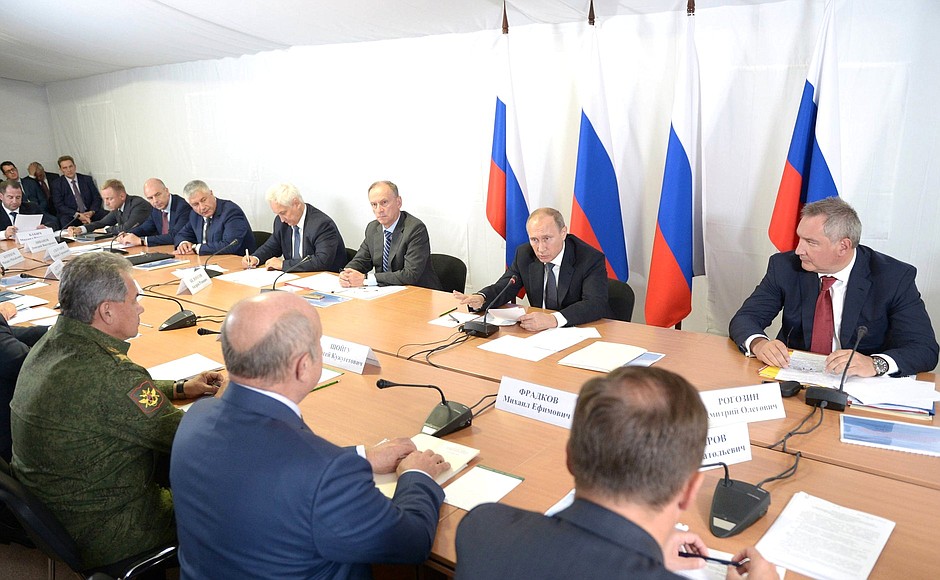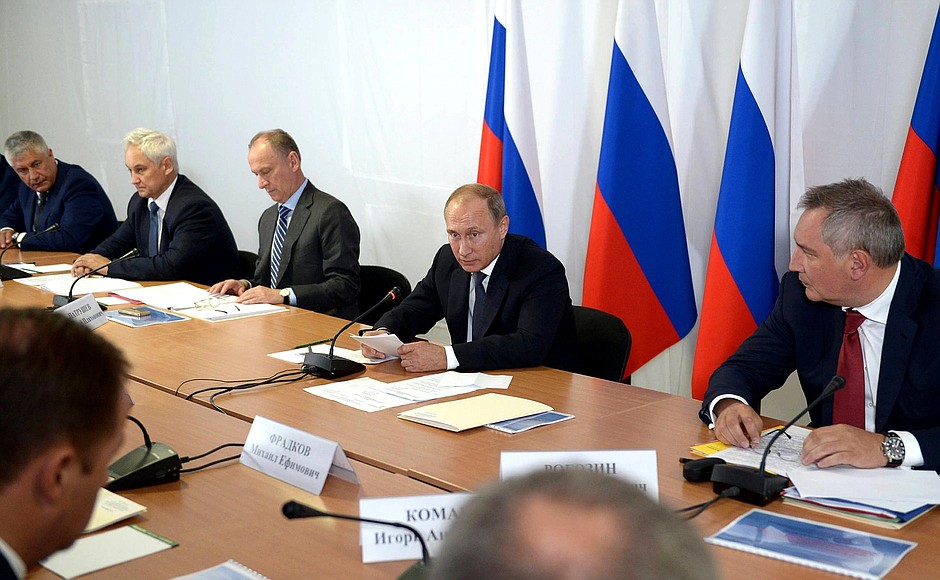* * *
President of Russia Vladimir Putin: Good afternoon, colleagues,
We have a busy and substantial programme here in Orenburg. We just saw the exhibition of new arms and met with the service personnel taking part in the Centre-2015 military exercises, which have been putting new models of arms and military hardware through real tests in the field. The exercises demonstrate the new arms systems’ excellent tactical and technical characteristics and once more confirm our defence industry’s considerable potential.
Now, at this Military-Industrial Commission meeting, we will discuss how to make the defence industry’s work more effective. First though, I want to address the defence industry representatives here today and congratulate all of you, your entire teams, your workers, engineers and production managers, on Defence Industry Workers’ Day, and wish you new achievements and all the very best. I wish you success!
Turning now to our agenda, in general, defence industry contracts have met the set deadlines and production volumes lately. The work on placing this year’s defence procurement orders is nearly complete now. There has been an improvement in this area. In this respect, judging from the situation overall, our biannual meetings here in Sochi are producing some results. It is not in vain that we get together here, close the doors to all other problems and focus solely on the matters that concern us. We have made visible progress.
As things stand now in mid-September, the armed forces have received more than half – around 52 percent – of the main types of arms that we planned to deliver this year. More precisely, they received 2,250 items of new equipment, including Su-34, Su-35S, and Su-30SM fighter planes, Mi-8MTV-5–1 helicopters, radar stations, new paratroopers’ vehicles, armoured personnel carriers, cars, and drones.
These results demonstrate good organisation and coordination between the defence industry, defence ministry, and industrial companies. But we need to continue these efforts to strengthen the entire sector and ensure that companies and design bureaus have the conditions they need to carry out contracts and continue their development, and, most importantly, be confident about their current situation and future outlook.
What does this require from us? Above all, we must maintain quality and keep up the pace we have set in carrying out defence procurement orders. The import replacement programme requires our particular attention, as it has a decisive part to play in ensuring our country’s technological and military security.
Work on import replacement began midway through last year and has been going on for a year now. We should keep in mind that we are now starting to replace increasingly sophisticated components and systems, and we have tight deadlines for production and delivery to the armed forces. We made a conscious and coordinated decision to shift some of the deadlines for delivery of new weapons systems, given that we need to organise our own production of the complex components involved. This work is imperative and it is vitally important that we do not simply talk about it but make sure that it actually takes place.
Ensuring the defence industry’s financial stability is another crucial task. It is true that long-term contracts concluded under the state armament programme are set in fixed prices that will not change as the contract is carried out, but the real inflation level is determined only at the end of the year, based on the year’s results, when the defence procurement contracts are to have already been completed. But when key macroeconomic indicators undergo negative change, this puts the companies in a difficult situation. They lose profits that they could have put into their own development, and they face problems in planning their budgets.
We thus need to come up with approaches that ensure balanced financing for state contracts. Let me say though that this must remain strictly within the limits of the allocated resources. Let’s discuss this in more detail. We understand that the exchange rate has changed and money takes on a different value. We need not figures on paper, however, but actual goods, the metal ‘stuff’ that is delivered to the armed forces.
It is clear that we need new investment if we want to strengthen the defence industry’s economic situation. We need funds that will allow us to develop all the main military and industrial technology, and carry out development work and applied research on new arms systems and military equipment.
Of course, we also need to improve the system of planning, financing and coordinating work to boost our capability in the most advanced scientific and technical fields. The heads of the leading defence industry companies and the chief designers have an important part to play here. We approved five candidates at the last meeting. Today, we will look at another six candidates for these important and responsible posts.
I hope the chief designers will find a new solution for more effective implementation of our most important projects for ensuring Russia’s defence and security and will take their companies to a new level in technology and production.
Let’s discuss all of this now.
<…>

